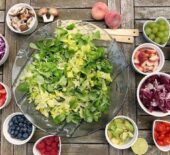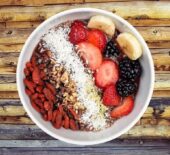Having moments when you can tell that your brain is not thinking clearly and in a ‘fog’ can feel frustrating. The good news is that there are certain nutrients which may help to clear the brain fog and help you function at your best.
Five key nutrients to add to your diet which may help clear brain fog include:
Omega-3 Fat
Omega-3 fat is an essential polyunsaturated fat. This means that you cannot make this fat in your body and you need to get it from the food you eat. Omega-3 fat is needed to make your brain cells as well as the regulation of neurotransmitters. Neurotransmitters are chemical messengers that control how messages are sent and carried through your brain.
Two omega-3 fats called Eicosapentaenoic acid (EPA) and docosahexaenoic acid (DHA) are of particular importance. DHA is the main type of fat that your brain uses. These two types of omega-3 fats are found in significant amounts in fatty fish like salmon, sardines, anchovies, herring, and mackerel. For health it is recommended to include one hundred grams of cooked seafood two to three times a week.
Vitamin D
This fat-soluble vitamin has many functions including optimising your immune system function and allowing calcium to be absorbed properly in your body. Achieving optimal amounts of vitamin D in your body may help reduce brain fog as insufficient levels may lead to a reduction in the production of neurotransmitters in your brain. Having low levels of vitamin D may also increase inflammation in your body. Chronic inflammation can decrease the health and function of your body in many ways including the function of your brain.
The main source of vitamin D comes from the sun but there are food sources which also provide your body with this fat-soluble vitamin. This includes foods like seafood, eggs which include the yolk, dairy, and fortified products like cereals, orange juice and margarine.
The adequate intake for vitamin D recommended by the National Health and Medical Research council for men and women aged between nineteen and fifty years of age is five micrograms per day. Between the age of fifty-one and seventy years the adequate intake increases to ten micrograms per day. From the age of seventy-one years and above the adequate intake further increases to fifteen micrograms per day.
Vitamin B12
Vitamin B12 also called cyanocobalamin is essential for the normal functioning of your central nervous system. Inadequate levels can lead anaemia, fatigue, and brain fog. It is a vitamin found in good amounts in animal-based foods like lean meat, poultry, seafood, eggs, and dairy.
Iron
Iron is a mineral needed to transport oxygen around your body, it also plays an important role in optimising your immune system. Without adequate oxygen, your brain cannot function well and can lead to brain fog. Men need eight milligrams of iron daily and women need eighteen milligrams of iron a day.
The easiest source for your body to use is called haem iron. This is the iron you will find in animal meats, chicken, and seafood; your body can absorb around twenty percent of haem iron. The other type in non-haem or the non-animal form of iron found in plant foods like wholegrains, legumes, tofu, fortified food and beverage products, leafy greens and nuts and seeds. Unfortunately, only around six point four to eighteen percent of non-haem iron is absorbed in your gut. This is one reason why vegetarians and vegans need to be mindful to include enough iron foods to get enough iron.
Magnesium
Magnesium is an essential major mineral your body needs to function. It is involved in over three hundred and twenty-five different body functions. It is needed for normal regulation of your nervous system as well as to keep your blood pressure in healthy levels. Both these functions promote optimal brain health.
Men over the age of thirty-one years need three hundred and fifty milligrams a day and women need two hundred and sixty-five milligrams a day.
Good sources of magnesium per one hundred grams include:
- Anchovies 101mg
- Oysters 98mg
- Mussels 75mg
- Salmon 30mg
- Tuna 50mg
- Firm Tofu 78mg
- Pumpkin seeds 592mg
- Sunflower seeds 370mg
- Peanut butter 180mg
- Uncooked rolled oats 104mg
- Raw spinach 107mg
- Raw almonds 266mg
- Cheese 70mg
- Avocado 73mg
- Wholewheat bread 99mg
- Quinoa 64mg
- Brown rice 143mg
Take home message: If you feel that your brain is not working at its best and frequently suffer from brain fog try including these nutrients in sufficient quantities in your diet. It may be the missing link you need to feel like your brain is working at its best.
References:
- Australian Bureau of Statistics. www.abs.gov.au
- S. Afr Med J. 1983 Sep 28;64(14):552-6.








